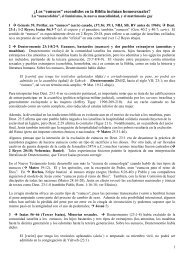Deuteronomy: - Fundación Otras Ovejas de Argentina
Deuteronomy: - Fundación Otras Ovejas de Argentina
Deuteronomy: - Fundación Otras Ovejas de Argentina
You also want an ePaper? Increase the reach of your titles
YUMPU automatically turns print PDFs into web optimized ePapers that Google loves.
power among other authorities: judges and officials who are just and cannot be bribed (1:9-18; 16:18-22), many of<br />
whom are the landless Levite priests (17:8-13), but now centralized in Jerusalem. 10<br />
7 One prophet (like Moses) and all the people prophets (Deut. 18:15-22; 13:1-5; 34:10; Jeremiah 28:5-9; Num.<br />
11:29; Joel 2:28-29; Acts 2:14-21; 1 Cor. 12–14). Since they had been <strong>de</strong>signated by God, the prophets, who came<br />
from the margins of society, maintained a certain autonomy with regard to the monarchy and other authorities.<br />
Yahweh your God will raise up for you a prophet like me from among your own people; you shall heed<br />
such a prophet (Deut. 18:15).<br />
Never since has there arisen a prophet in Israel like Moses, whom Yahweh knew face to face (Deut. 34:10;<br />
� John 1:18).<br />
Unity and Diversity. The dialectic of the book of <strong>Deuteronomy</strong> reflects something similar to the Greek<br />
philosophers‘ problem concerning unity and diversity in human experience. But the problem not only reflects a<br />
dialectic in the history of Israel and in Greek philosophy, since all human experience and history point toward the<br />
same dialectic:<br />
� The multiplication and diversity of or<strong>de</strong>rs in the Medieval church gave way to the even greater conflict<br />
between incurable Protestant diversity and the strangulating unity of the Catholic Church after the Council<br />
of Trent (<strong>Deuteronomy</strong> has always been a favorite book among Catholic theologians);<br />
� The diversity of sovereign states (some of them <strong>de</strong>fending their right to perpetuate racial slavery) in<br />
conflict with the growing national unity of the United States produced the Civil War / War Between the<br />
States from 1861 to 1865—a tension which is evi<strong>de</strong>nt in almost all mo<strong>de</strong>rn nations (see the disintegration<br />
of the Soviet Union and the conflict between Buenos Aires or Paris and the outlying provinces);<br />
� The Russian Communist Empire, attempting to impose i<strong>de</strong>ological unity and the practice of social justice,<br />
yiel<strong>de</strong>d with regard to the Capitalist Empire that, in turn, insists on a free market and a diversity of<br />
consumers (with little social justice).<br />
The hermeneutic dialectic predominant in <strong>Deuteronomy</strong> reflects the tension between traditions and their—<br />
sometimes radical—adaptation for ensuing generations, 11 and the book‘s theological statements reflect similar<br />
tensions.<br />
1. The poor and oppressed. As David Pleins 12 points out, almost all the vocabulary explicitly used to <strong>de</strong>scribe<br />
the poor and oppressed (15 instances) is concentrated in two key texts (Deut. 15:1-11 and 24:10-15). <strong>Deuteronomy</strong><br />
is mostly concerned with certain concrete groups of weak people: Levites (landless), immigrants, orphans,<br />
widows, slaves and day laborers (see below; cf. � Exodus 21:13). Given the great sapiential influence on<br />
<strong>Deuteronomy</strong>, it is notable that two of that literature‘s two favorite terms for the poor (dal, rash; � Proverbs) are<br />
absent, which suggests that <strong>Deuteronomy</strong>‘s perspectives on poverty tend to follow the Book of the Covenant more<br />
closely (� Exodus 21–23).<br />
The poor:<br />
‟ebyon, 15:4, 7, 7, 9, 11, 11; 24:14 (seven occurences);<br />
‗ani, 15:11; 24:12, 14, 15 (four occurences);<br />
makhsor/khasar, 15:8 (one occurrence);<br />
The oppressed. See 19:16, violent witness (khamas); 4:30, exilic oppression (tsarar I):<br />
‗ashaq 24:14 to oppress (the day laborer, the poor-oppressed, the needy one); see 28:43 („ashaq);<br />
‗ani, 15:11; 24:12, 14, 15 (poor, oppressed, humiliated; four occurrences);<br />
„anah, 22:24,29 (to rape); cf. 8:2-3, 16, where Yahweh Himself ―oppresses/humiliates‖ Israel<br />
(´anah, three times) and causes famine. 13<br />
5

















